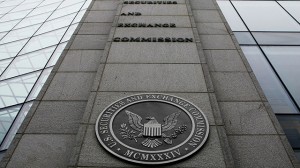The Project on Government Oversight (POGO), a government accountability watchdog group, published a report this week on the so-called “revolving door” at the Securities and Exchange Commission. Authored by POGO Investigator Michael Smallberg, the report highlights numerous examples of how the back and forth of SEC regulators between jobs in Washington and on Wall Street blunts the agency’s effectiveness.
Smallberg includes recommendations for how the SEC and other parts of the government could take action to limit the negative effects of the revolving door. We spoke with Smallberg about his report and the corrosive effect of what he calls “regulatory capture” — what happens when an agency is “captured” by the industry it regulates.
John Light: Why is the revolving door a potential problem for regulatory bodies in general, and specifically for the SEC?
Michael Smallberg: When you have so many people going back and forth from a regulatory agency to the regulated industry, it can shape the mindset of people throughout the agency and make them more sympathetic to the viewpoints of industry groups, sometimes at the expense of people with a stake in the agency’s mission, like consumers, investors or shareholders. In some cases, people who used to work at the agency have connections to people who are still there. They can take advantage of that access to obtain favors for their clients, who, in many cases tend to be large institutions that have the resources to hire these alumni.
The revolving door creates a risk of what we call “regulatory capture” — when companies are able to sway the policies of the agency in their favor. Many of these agencies are supposed to be independent regulatory agencies — independent not only from political pressure that might be applied by Congress, but also from large industry groups. The revolving door between a regulator and a regulated industry creates at least a heightened danger of regulatory capture.
Then there’s a question of optics: The appearance that a regulatory agency is cozying up to the companies it’s supposed to regulate can undermine the public’s confidence in the regulatory system, which in turn can make the regulatory agencies less effective. And on another level, the revolving door can devalue the notion of public service. When you have so many people who are looking at their government position as a stepping stone to going into the private sector and making much larger salaries working for the big companies, we worry that will demoralize other civil servants who are looking at their government service as more of a life calling.
Light: Your report looks not just at the records of SEC commissioners, but of hundreds of lower-level employees who went on to represent employers and clients before the commission within two years of leaving. How can these low-level SEC employees influence regulation after they leave the organization?
Smallberg: Even some lower-level employees can still provide a very valuable service to their clients after leaving the SEC by helping them to navigate the regulatory landscape. In some cases, they may be able to help their clients present arguments to the SEC in a way that’s going to be more effective, because a person who used to work there — even at a lower-level position — knows what kind of arguments will be most persuasive to the agency. The SEC was able to obtain a waiver for what the agency calls its “middle managers” so that a lot of those middle managers did not have to follow the one-year “cooling off period” before entering the private sector that applies to employees throughout the executive branch. We found some examples of people who left the agency and were contacting the SEC on behalf of a new employer or client within weeks or months of leaving.
Light: People on both sides of the revolving door and some political researchers argue that it might actually help regulatory bodies to be led by industry insiders because those insiders have the best possible understanding of how the industry works. Do you feel that’s a valid argument?
Smallberg: This has been a big debate going back to the founding of the SEC, when FDR appointed Joseph Kennedy to head the agency under the notion that it takes a crook to catch a crook, so to speak. In more recent years, the SEC told us they’ve brought on more people with expertise in collateralized debt obligations or other complex mortgage products that were at the heart of the financial crisis, and they say hiring those people helped the agency do a better job of detecting problems in these markets and protecting investors. I think there’s some value to that argument.
But there are a few problems. In our report, we talked about Commissioner Dan Gallagher, who is someone who has gone back and forth a few times between the SEC and the law firm of WilmerHale, which is one of the top recruiters of SEC alumni. When he joined the agency as a commissioner, he had to sign an ethics agreement where he said that he would essentially recuse himself from working on matters involving his former clients. But when we filed a public records request to find out how the SEC sorts out his potential conflicts of interest, the agency withheld approximately 1,500 pages in response to this request. We can debate whether the revolving door is a good thing or a bad thing, but at the very least we think the American people should be able to see how an agency like the SEC sorts out these ethical questions, especially since these senior officials are entrusted with protecting investors and policing the financial markets.
Light: How would you like to see the Senate Banking Committee handle confirmation hearings for Mary Jo White, President Obama’s pick for the new head of the SEC?
Smallberg: We think they’re going to have to take a very close look at the work she’s done over the last decade at a white collar defense firm. She has represented big firms like JPMorgan during SEC investigations. She represented companies like Northrop Grumman and Honeywell and Google in trying to water down the SEC’s whistle-blower program. This is a program in which the SEC can provide financial awards to whistle-blowers who tip the agency off about fraudulent behavior within a company, and we think it’s a vital tool for the SEC to crack down on fraud.
We think they need to take a very close look at the financial disclosure and ethics statement that was released last week, because you can see that there are going to be some very complicated issues that have to be sorted out when she’s in that position, and we do worry, for example, that if she has to recuse herself from handling matters involving JPMorgan for some time after she joins the agency, that that might make her less effective as head of the agency. The SEC tells us that they’re blessed with talent throughout the agency, so even when one official has to recuse himself, another official can step up and take his place, but when it’s someone at the commissioner level, sometimes this can have a big effect on votes that the commission takes.
We think, in particular, that they should probe Mary Jo White to get her positions on regulatory issues. A lot of people have focused on her enforcement background, but she also could be in a position now to work on issues like money market fund regulations, which in some ways could be just as important as individual enforcement cases, because those regulations will affect companies throughout the industry.
Light: What reforms would you like to see to limit the influence of regulators who pass through the revolving door?
Smallberg: At a basic level, we think transparency can play a huge part here. It’s to the SEC’s credit that they require former employees to file these post-employment disclosure statements with the agency. But we think the SEC could go a step farther by proactively posting these things online, so that we don’t have to wait to go through the Freedom of Information Request process to get these records. And we think other agencies throughout the government should also be doing a better job of tracking where their former employees go to work, and to make that information available to the public.
We do think there should be some extension of the so-called “cooling off periods” when employees enter and leave the SEC, so that there’s at least some minimum time-out period before they can represent clients before the agency. We think this would at least help to address some of the more serious conflicts of interest, when people leave the agency on Friday and show up on Monday working for a company that the SEC regulates.
The SEC is perennially outmatched funding-wise by the firms that represent companies under SEC investigation, so we think it’s very important for Congress to provide the SEC enough funding for it to really carry out its mission without having to rely so much on industry groups to help explain regulations or even investigate themselves when the SEC doesn’t have the resources to do so.
We also echo concerns that have been raised by federal judges, who have questioned the settlements that the SEC enters into in which the defendant typically does not admit any wrongdoing and will often simply pay a fine to essentially settle the SEC’s charges. Some people are very concerned that these no-admit settlements, in which no senior executives are charged, have just become the cost of doing business for a lot of large financial institutions. These settlements can be very frustrating because the SEC often does not lay out all the evidence of facts being collected in the case. All you get is sort of a vague summary of the findings.We think the SEC, with all of its investigative power, should at least be required to put more of the underlying facts into the record so that other people can evaluate the allegations and perhaps take their own action to recover funds for defrauded investors or go after companies that violated securities laws.
Light: Do you think we’re likely to see these changes?
Smallberg: You know, it’s a challenge. Of course, you also have a revolving door in Congress. You have a revolving door at the Department of Justice and other agencies that have a role to play here. But we hope that if there’s enough public outrage over the revolving door it will inspire people to at least take some modest steps to try to mitigate its most adverse effects.
Take Action
To read Smallberg's full list of recommendations for how to prevent regulatory capture, read Chapter 9 of his report, Dangerous Liaisons: Revolving Door at SEC Creates Risk of Regulatory Capture.
On our Take Action page, Smallberg also gave Moyers & Company some recommendations for what you as an individual can do to help stop the revolving door.



